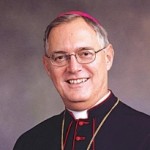
“O Lord, in your light we see light itself.”
–a 1st Antiphon of Lauds
In the comments section of the post below, the subject of Humanae Vitae has arisen. I am of the opinion that Paul VI’s encyclical was prophetic, but poorly taught and too quickly dismissed; its message was unwelcome in an “if it feels good do it” era.
Deacon Greg notes that what Pope Benedict has said in Light of the World is not appreciably different from what Paul VI proclaimed in 1968:
“The Church does not consider at all illicit the use of those therapeutic means necessary to cure bodily diseases, even if a foreseeable impediment to procreation should result there from–provided such impediment is not directly intended for any motive whatsoever.”
Humanae Vitae is not a long encyclical; perhaps it is time for people to really read it.
Meanwhile the AP has some reaction coverage, but I recommend going over to America and reading Austen Ivereigh’s terrific bit of background on this pronouncement by Benedict. As usual, intention matters:
The point argued by moral theologians was always this. The Church is opposed to artificial contraception, not condoms per se. Just as, in Humanae vitae, the Pill may be used for medical purposes (to prevent heavy bleeding, say), if the intention of using a condom is to prevent infection, not pregnancy, then it was not contraceptive in intention. The point is obvious that — not to put too fine a point on it– a condom used between two men can hardly be considered contraceptive in its purpose; and the same would be true if a husband who returns from the mines infected with HIV uses one to stop his wife getting infected…
…In 2008, while at a conference in Rome, I happened to meet a senior CDF official (I won’t give his name) and asked him what had happened to the commission [set up to explore the issue of condom use to prevent AIDS]. “Everyone knows that theologically there is a strong case for clarifying that teaching,” he told me, “but there’s just no way of doing it publicly without it being misunderstood.” Do you mean, I pressed him, that the Vatican feared the headlines that would result? “Exactly,” he said. “It would be confusing for the faithful.” There was “just no way”, he said, that the Vatican could make this clarification without seeing headlines like “Pope backs condoms” or “Church in reverse on contraception”.
His remarks depressed me — although I understood the communications difficulty.
In February this year, it came to light that the commission had been stood down, and that the report had “never got off the ground” in the word’s of the Health Council’s deputy, Bishop Redrado. I wrote an indignant piece here, entitled “The suppression of theological truth”. It frustrated me that, as a media commentator, I could not articulate what I knew the Vatican believed without being attacked by some Catholics for failing to uphold church teaching.
Now, it seems, Pope Benedict has decided to use the relatively informal, under-the-wire format of a book interview to signal what seems to the outside world as a historic shift but which is no more than expressing what is obvious. But it is a risky thing to do, and Pope Benedict’s courage is to be saluted.
But at least we can now have a real discussion about the issue — and the Church can speak with the moral authority which, as the organisation which does more than any other for Aids sufferers in Africa, it surely has.
All emphasis mine. Read the whole thing.
Then read the report Ivereigh references in his piece in his piece, written by Fr. Martin Rhonheimer, of Opus Dei:
The teaching of the Church is not about condoms or similar physical or chemical devices, but about marital love and the essentially marital meaning of human sexuality. It affirms that, if married people have a serious reason not to have children, they should modify their sexual behaviour by at least periodic abstinence from sexual acts. To avoid destroying both the unitive and the procreative meaning of sexual acts and therefore the fullness of mutual self-giving, they must not prevent the sexual act from being fertile while carrying on having sex.
But what of promiscuous people, sexually active homosexuals, and prostitutes? What the Catholic Church teaches them is simply that they should not be promiscuous, but faithful to one single sexual partner; that prostitution is a behaviour which gravely violates human dignity, mainly the dignity of the woman, and therefore should not be engaged in; and that homosexuals, as all other people, are children of God and loved by him as everybody else is, but that they should live in continence like any other unmarried person.
But if they ignore this teaching, and are at risk from HIV, should they use condoms to prevent infection? The moral norm condemning contraception as intrinsically evil does not apply to these cases. Nor can there be church teaching about this; it would be simply nonsensical to establish moral norms for intrinsically immoral types of behaviour. Should the Church teach that a rapist must never use a condom because otherwise he would additionally to the sin of rape fail to respect ?mutual and complete personal self-giving and thus violate the Sixth Commandment?? Of course not.
I think it is a very good thing that Pope Benedict has spoken about this issue via the book – it takes the whole matter out of the world of encyclicals and exhortations (which are often either unread or mischaracterized) and brings it into the light of the public square and open discussion. If it gets a few people to pay attention, smack their foreheads and say, “wait…you mean the church was never as unreasonable and inhumane as we’d been told?” That will be something, won’t it?
The Holy Spirit uses what is at its disposal for its own purposes, and moves as it will. This pope has been all about giving the Holy Spirit room to move and work.
And in retrospect, now that we see his remarks in The Light of the World sort of confirms my sense of what Benedict was saying between the lines of his Letter to Seminarians: don’t worry about the passing times; have faith in the light, eternal and ever-dawning.
The importance nowadays of ecumenical theology, and of a knowledge of the different Christian communities, is obvious; as is the need for a basic introduction to the great religions, to say nothing of philosophy: the understanding of that human process of questioning and searching to which faith seeks to respond. But you should also learn to understand and – dare I say it – to love canon law, appreciating how necessary it is and valuing its practical applications: a society without law would be a society without rights. Law is the condition of love . . . love the study of theology and carry it out in the clear realization that theology is anchored in the living community of the Church, which, with her authority, is not the antithesis of theological science but its presupposition. Cut off from the believing Church, theology would cease to be itself and instead it would become a medley of different disciplines lacking inner unity.
Meanwhile, Lisa Graas–in a nice post–uses an example of a loving mother and two sons, to help flesh out the pope’s meaning, and notes unusual unity on the Catholic blogs:
Pope Benedict was expressing the position of the good Catholic mother in his remarks, but certainly, was in no way saying that the Church has changed her position on the matter of condom use. It’s not all that difficult to understand if one takes time to try to understand it, but it was widely and grossly distorted. So are the perils of living in a pluralistic society, but also of living in a society that despises the Church and seeks to misrepresent her at every turn.
I’d like to emphasize again that the Pope noted that even though we do have this understanding in regard to condom use, it is not the way to solve the AIDS problem. Further, as I noted in my previous article, the Catholic record on that is clearly better than that of those who disagree.
I’d also like to make mention that while the mainstream (non-Catholic/anti-Catholic press) immediately jumped on the Pope’s words and mischaracterized them, the Catholic media jumped on the Pope’s words and offered clarity. I believe this is an amazing testimony to Catholic unity and our ability to understand independently the teachings of our Faith. Jesus said, “My sheep hear my voice.” The Catholic sheep heard the shephard’s voice and understood. Everyone else, eh, not so much.
John Allen: Benedict is his own best spin doctor.
UPDATE: Archbishop Chaput:
In the context of the book’s later discussion of contraception and Catholic teaching on sexuality, the Pope’s comments are morally insightful. But taken out of context, they can easily be inferred as approving condoms under certain circumstances. One might reasonably expect the Holy Father’s assistants to have an advance communications plan in place, and to involve bishops and Catholic media in a timely way to explain and defend the Holy Father’s remarks.
Instead, the Vatican’s own semi-official newspaper, l’Osservatore Romano, violated the book’s publication embargo and released excerpts of the content early. Not surprisingly, news media instantly zeroed in on the issue of condoms, and the rest of this marvelous book already seems like an afterthought.
Don’t let that happen. Don’t let confusion in the secular press deter you from buying, reading for yourself, and then sharing this extraordinary text. It’s an astonishing portrait of an astonishing man.
Related: Some “seat warmer”!











